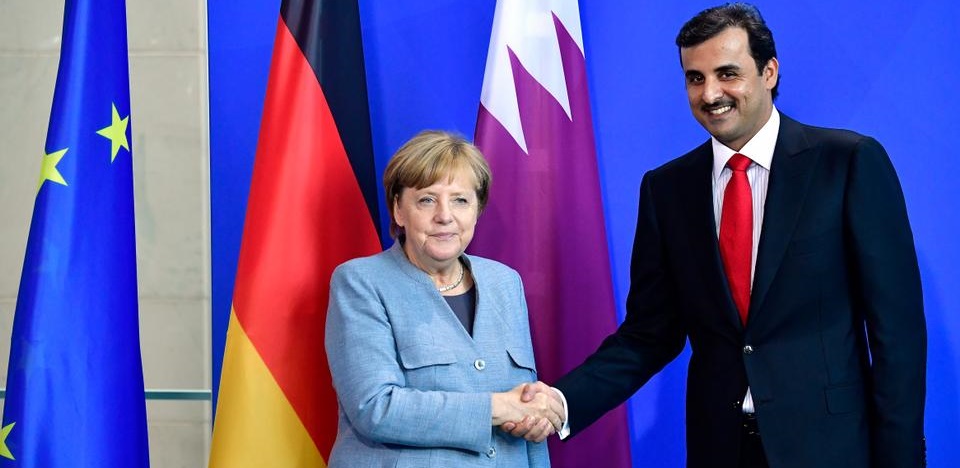Alwaght- The German Chancellor Angela Merkel and The Qatari Emir Sheikh Tamim bin Hamad Al Thani are expected to meet as the two countries' chambers of commerce hold their summit on September 5 and 6. The forum is of special importance as Doha leaders embark on a new approach of increasing the investment in Germany industries.
In the past few years, and specifically when the economic crisis struck much of the Western economies in 2008, the Qatari government bought major shares in the German industry giants such as Volkswagen, Siemens, Solar World totaling to $20 billion. The news reports have lately suggested that during the meeting, the Qatar leader is expected to unveil new multi-billion investment plans in the German industrial sector.
Ali Sharif al-Emadi, the Qatari finance minister, has recently told the press that Doha looked at Berlin as a key player in the global economy and was optimistic about the future of the markets of the European economic heavyweight. The remarks of openness to investment in Germany come while the Qataris in the past suffered financial losses from their investments in Germany's Solar Systems and Deutsche Bank.
Due to interconnected economic, political, and military developments in the today’s world, we cannot simplistically think that the small but wealthy Persian Gulf monarchy simply tends to expand its business ties for the sake of financial profits. Rather, the new approach has its roots deep in the politics. The Qatari leadership has a special trick to pursue its regional foreign policy and deter the security challenges Doha is facing: Using the huge economic potentials and wealth. The west Asian Sheikhdom is not a huge country with huge potentials to realize its political goals using power, rather it is a small country that, except for the wealth, is devoid of large size, population, and military force, all of which mix to offer the element of power. Therefore, the key drive behind the new investment in Germany is an interest to take the political support of Berlin, as the leader of the European Union, in the face of the existing security challenges.
Qatar relations with Saudi Arabia, the UAE, Egypt, and Bahrain has been tense since June 2017 as the Riyadh-led Arab bloc severed ties with the emirate and announced sanctions ranging from air, sea, and ground blockade to blocking Qatari-run news websites in the four countries. They also threatened Doha with military action after the latter rejected a 13-demand letter asking it to comply with before lifting the ban.
In the middle of tensions, Doha sought to force back the economic and political pressures by turning head to regional actors, Turkey and Iran, both well-recognized rivals of the Saudi-led camp. It also resorted to relations boost with Russia, a power antipathetic to the US and Saudi destabilizing policies in the region. Signing a contract with Moscow to buy S-400 air defenses in January this year exactly served this end.
As the Qatari-German relationship set for growth, Berlin’s ties with Riyadh appear to suffer from some troubles. This is to some extent because of the German criticism against the Saudi behavior in the region. Germany's Foreign Minister Sigmar Gabriel’s criticism of the Saudi regional behavior, including the pressures on Qatar and intervention in Yemen and Lebanon, sparked a spat in March between the two sides. The German newspaper Der Spiegel in a report in late May told of “frosty” reception of the German firms in the Arab kingdom, adding that some 800 German companies and businesses in Saudi Arabia faced a serious risk of activity halt due to the political tensions between the partners.
Germany is the biggest European business partner of the Arab monarchy. Mohammed bin Salman's response to the remarks of the German FM and Berlin’s willingness to keep alive the Iran nuclear program after Trump withdrawal in early May have effectively strained their bilateral ties. Saudi Arabia in May decided to exclude the German firms from the government tenders, putting at a shaky ground the future of the German exports to the kingdom worth of $7.67 billion. Despite the fact that the heads of Daimler Group denied the decline in the cooperation with Saudi Arabia, the figures show a fall in the two countries’ economic partnership.
In the middle of this, Qatar says it intends to bolster the investment in Germany as an economic power. The essential purpose of Doha is to ease Berlin’s worries about possible shrinkage in economic partnership with Riyadh. If the Qatari leaders manage to meet this goal, they can attract Germany’s diplomatic and security backing. The outcome will be Germany's increased criticism against the Saudi regional policies. This reflected itself recently when some German parties opposed arms contracts with Riyadh. Ursula von der Leyen, the German defense minister in July said that Qatar is subject to a conspiracy from some of its neighbors to undermine its citizens' security. Leyen demanded full Doha involvement in the international coalition to fight extremist groups.
Cooperation with Germany allows Qatar to diversify its international allies. To date, Washington has been the exclusive ally of Doha, receiving special privileges in return for security provision. Qatar allows the US to use Al-Udaid air base for free. It also gives special privileges to the American companies in its oil and gas industry. Making huge military purchases from the US is another sweetener to the Americans. But to its frustration, the Americans have sided with the Saudis in the anti-Qatari pressures to abandon its foreign policy including links to Muslim Brotherhood, something pushing the Doha leaders to seek a new powerful ally.
So, the Qatari-German leaders’ meeting can address Doha political, security, and economic demands, though the Qataris are aware of strong German-Saudi economic bonds.



























